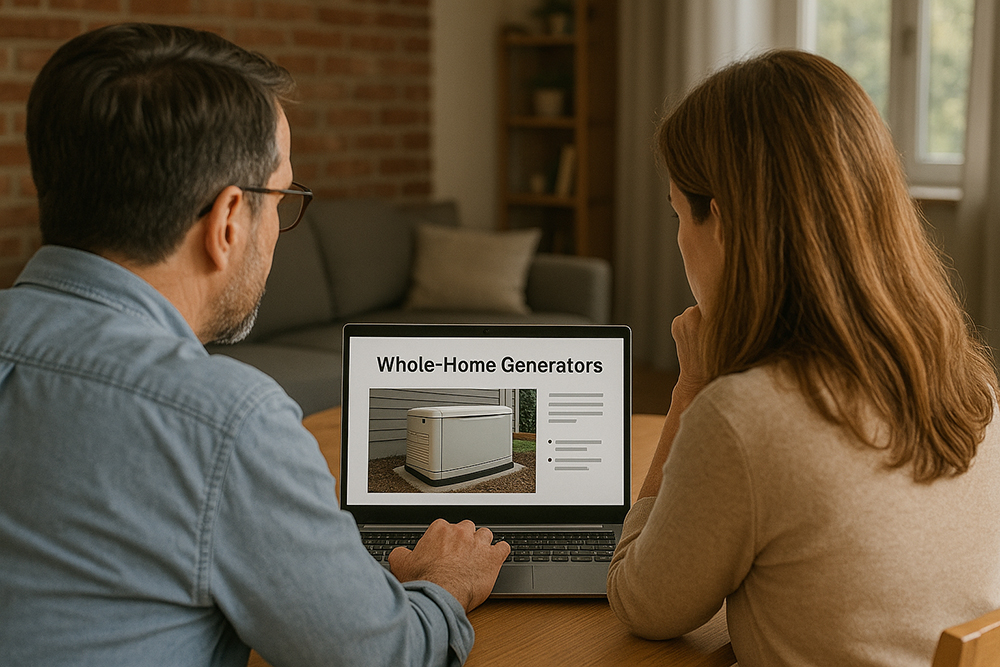
Is a Whole-Home Generator Worth It in Lost Creek? What Residents Should Know as Hurricane Season Ramps Up
As hurricane season enters full swing across the Greater Houston area, residents of Lost Creek are once again evaluating how best to prepare for potential power outages. With memories of past storms still fresh—whether it was Hurricane Harvey’s days-long blackouts or the February freeze that left neighborhoods in the dark—many homeowners are asking: Is a whole-home generator worth the investment, or can a portable generator do the job?
The answer depends on your home’s needs, health considerations, and budget—but understanding the trade-offs between the two can help families make informed decisions before the next storm hits.
Whole-Home Generators: Peace of Mind Comes at a Price
A whole-home generator, also known as a standby generator, is permanently installed and automatically powers your home during an outage. It runs on natural gas or propane and can keep air conditioning, refrigeration, lighting, and medical devices functioning seamlessly—even during prolonged blackouts.
“Whole-home generators offer uninterrupted comfort, especially critical for medically vulnerable individuals or seniors sensitive to heat,” said Joshua Rhodes, Ph.D., an energy researcher at the University of Texas at Austin, in an interview with Texas Monthly. “They’re also invaluable for households working remotely or managing home-based businesses.”
In Houston’s climate, where heat indexes routinely exceed 100°F, the stakes are high. The CDC warns that elderly individuals are at higher risk of heat-related illness, especially during power outages that knock out air conditioning. Likewise, residents who rely on electricity for oxygen machines, dialysis equipment, or refrigerated medications face serious health risks without a reliable backup.
Mobile Sidebar Ad
Cost and Considerations
- Average Price (Houston area): $9,000 to $15,000 installed
- Pros: Automatic operation, powers the entire home, low maintenance when professionally serviced
- Cons: High upfront cost, requires professional installation and fuel hookup, may require permits or HOA approval
Important Reminder for Lost Creek Residents: If you're planning to install a whole-home generator, be sure to consult your HOA’s architectural guidelines before beginning any work. Most homeowners associations—including those in Lost Creek—require residents to submit an application for exterior modifications, including generators. Failing to get prior approval could result in fines or having to remove non-compliant installations.
Portable Generators: Budget-Friendly Backup with Limitations
Portable generators are smaller, less expensive units that can be manually set up to run essential appliances during an outage. They typically run on gasoline or propane and are ideal for powering select items like refrigerators, fans, lights, or charging devices.
“Portable generators can make a huge difference during short outages, but they’re not meant for whole-house loads,” said Rhodes. “They require hands-on operation and careful fuel management, which can be tricky if you’re not home when the outage hits.”
Cost and Considerations
- Average Price (Houston area): $500 to $1,500 depending on wattage
- Pros: Affordable, easy to store, flexible use
- Cons: Manual setup, limited capacity, noisy, safety risks if misused
Safety First: Generator Use Tips
Whether you opt for a portable or whole-home generator, safety is paramount. According to the National Fire Protection Association (NFPA) and FEMA, improper generator use can lead to fatal carbon monoxide poisoning, electrocution, or fire.
Safety Guidelines
- Never use a portable generator indoors or in enclosed spaces (including garages).
- Keep generators at least 20 feet away from your home, windows, and doors.
- Install a carbon monoxide detector in your home.
- Allow generators to cool before refueling.
- Use heavy-duty extension cords rated for outdoor use.
Mobile Sidebar Ad
When a Whole-Home Generator Makes Sense
For some Lost Creek residents, a whole-home generator isn’t a luxury—it’s a necessity. If anyone in your household:
- Depends on electric-powered medical devices
- Is over the age of 65 and sensitive to extreme heat
- Has infants or small children requiring climate-controlled environments
- Works from home with limited disruption tolerance
—then a whole-home generator may offer essential peace of mind.
Still, for homeowners on tighter budgets or those with the ability to evacuate during major storms, a well-maintained portable generator may provide sufficient backup power for critical needs.
Hurricane Season Outlook: Don’t Wait to Decide
The 2025 Atlantic hurricane season, which began June 1, is forecast to be more active than average, with NOAA predicting 17 to 25 named storms and 8 to 13 hurricanes. Power grid reliability remains a concern across Texas, especially in the wake of recent surges in summer demand.
If you're considering investing in backup power, it's better to act sooner than later. Supply chain delays and last-minute demand can cause price spikes or installation bottlenecks as storms approach.
Final Thought
Every home is different, and the right choice depends on your household’s priorities. But one thing is clear: preparation is key.
Stay tuned with My Neighborhood News for updates on local resources, emergency preparedness workshops, and power infrastructure developments in Lost Creek.
 Tiffany Krenek has been on the My Neighborhood News team since August 2021. She is passionate about curating and sharing content that enriches the lives of our readers in a personal, meaningful way. A loving mother and wife, Tiffany and her family live in the West Houston/Cypress region.
Tiffany Krenek has been on the My Neighborhood News team since August 2021. She is passionate about curating and sharing content that enriches the lives of our readers in a personal, meaningful way. A loving mother and wife, Tiffany and her family live in the West Houston/Cypress region.








